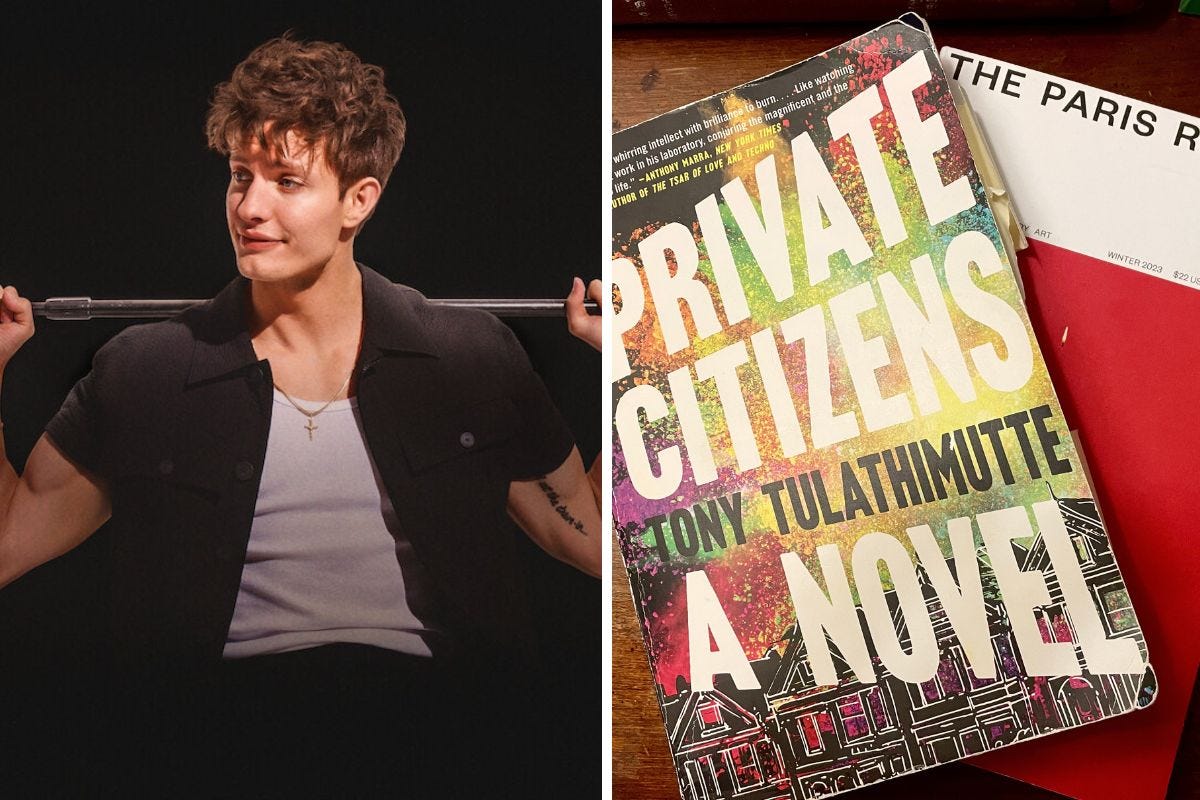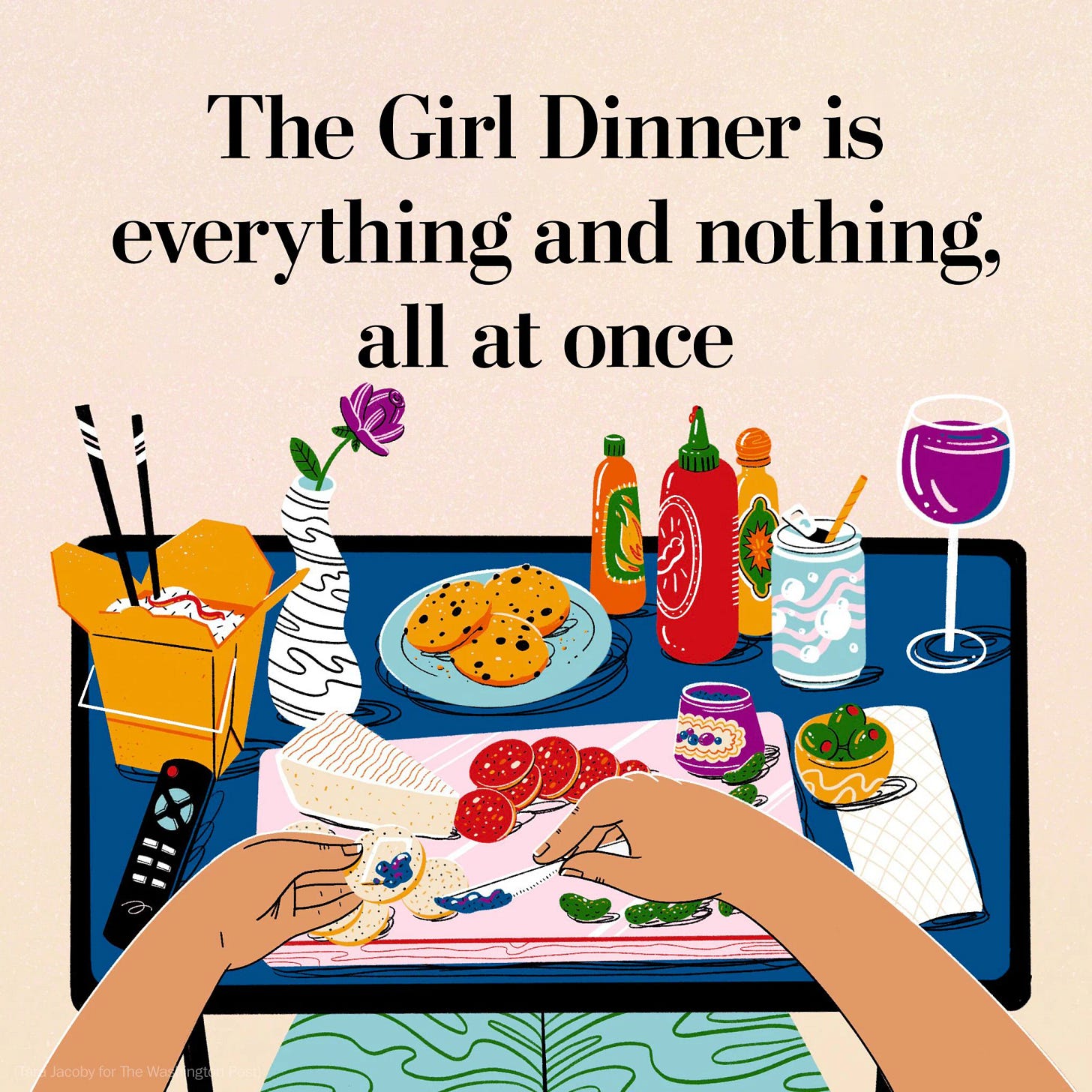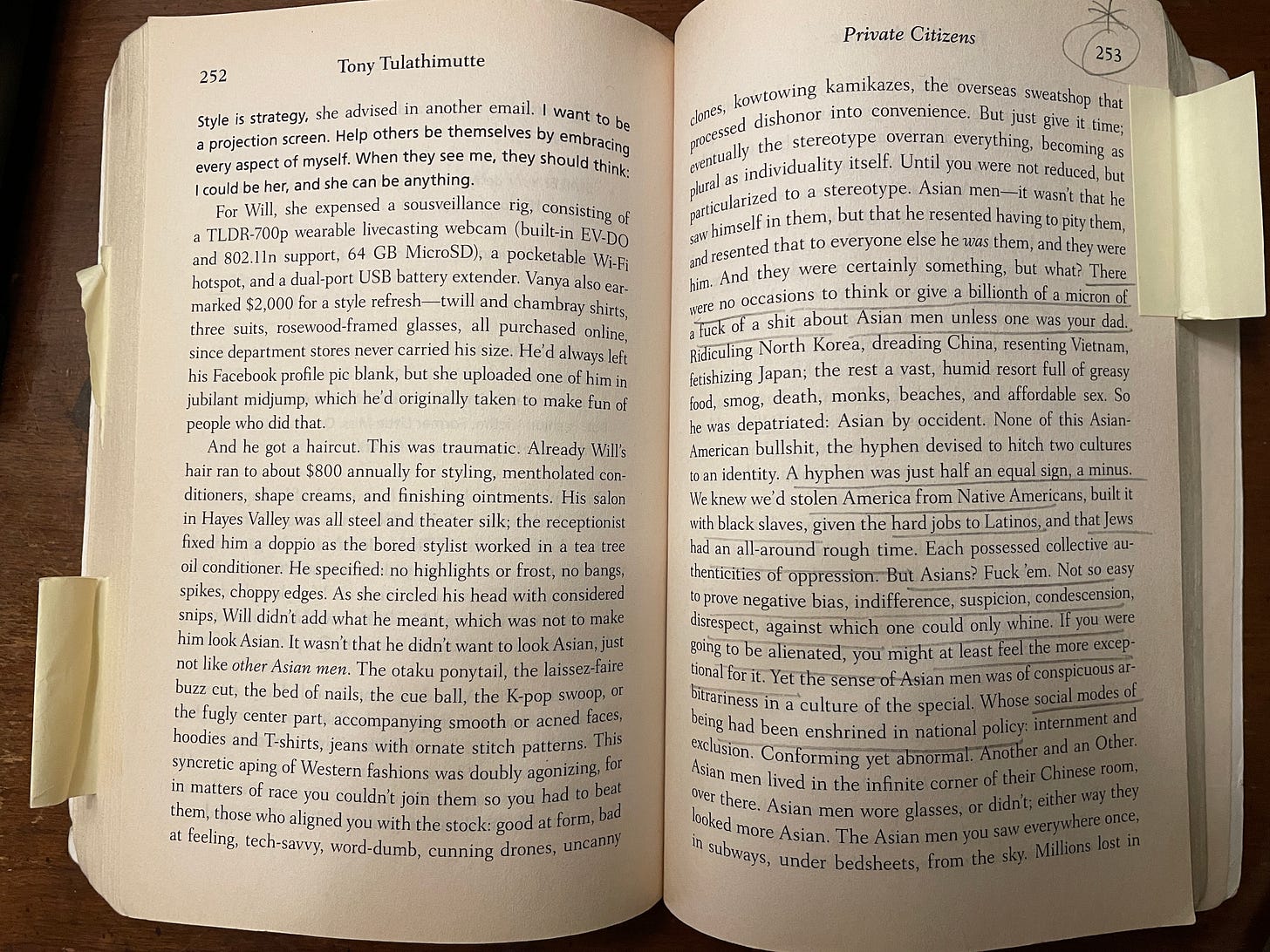This piece isn’t really about Matt Rife. If it were, it’d be about two months too late. Yes, his face is on the cover photo above. I thought maybe it’d still be somewhat of a (hate-)draw, though are people still talking about him? At least he’s balanced out by The Paris Review and Tony Tulathimutte’s excellent novel Private Citizens, both of which I’ll get into later.
More than Rife’s material, I was interested in what he said in one of his interviews, where he said that his new Netflix special was more “way more for guys.” So I watched it to get what his idea of male-oriented comedy was. From what I gathered, it seemed to consist of a domestic violence joke, some jokes about the silliness of astrology and crystals, then a lot of jokes about loving old people, watching porn for the first time, and believing in monsters in closets. I don’t know why he’d think a domestic violence joke was what guys are aching for, unless there’s a Honeymooners revival on TikTok that I don’t know about. Besides that attention-hogging joke, there wasn’t much to discuss. You might half-chuckle at some of his jokes in the moment, then forget about them by your next meal.
This version of for-guys culture is one of petulance, defined mostly by irritation at the inescapability of certain female-dominated interests or the feeling of being watchdogged by female societal supervisors. That being said, it’s not tantamount to misogyny to poke fun at things that girls and women are disproportionately interested in. Why should women’s interests be so protected as if those things are fragile and fledgling fields, as opposed to multi-billion-dollar behemoths? There’s room for some playful boys vs. girls banter. And of course, women have every right to make fun of guy stuff too. Both genders have their self-serving bullshit. I may shake my head at The Bachelor, but I also follow the NBA, where men spend hours discussing which 33-year old man unfollowed which 25-year old man on Instagram.
What would a non-snarky modern (heterosexual) male culture look like? I don’t think we know because the question itself angers many people, as if wanting such a culture is barely better than yearning for a Nazi culture. But Nazism is a fringe ideology that people rightfully want to minimize. In contrast, boys and men make up about half the population. And despite the trendiness of the idea of gender being a false and even irrelevant construct, people’s behavior indicates otherwise, with girl-this and boy-that trends dominating all aspects of online culture. We are very much invested in gender bifurcation.
Some may fear that yielding any ground to straight guys’ perspectives will result in the metastasizing of Andrew Tate-inflected manosphere culture. But those cultures also spring up because young men don’t have many gender-specific alternatives. I’ve experienced some version of this in the Asian American community years ago, where the voicing of straight male concerns and experiences was almost always shut down as misogynistic in mainstream circles. That left only two alternatives: just shut up and take it, or migrate to angry online echo chambers. One of the main reasons that my friends and I started Plan A Magazine and the Escape From Plan A podcast was to circumvent that false choice. Undoubtedly, the presenting of that false choice is a sound strategy, because your rivals/opponents are much easier to attack when they’re forced to become cartoonish extremists. And of course, they still attacked us anyway. Even more so because we weren’t so easily dismissed as kooks and cranks.
There was another recent bout of debate over whether BookTok is helping or hurting literature.
at Café Hysteria has written a good piece about how BookTok turns books into commodities. But defenders of BookTok say that anything that gets people reading is a net positive, though the prevalence of Harry Potter adults undermines that argument. More pointedly, those defenders also usually say that given the heavily female-skewing demographic of BookTok, criticizing it is simply misogyny.On that last point, it’s good that girls and women have a plethora of contemporary cultural works through which they can express and relate their aspirations, fears, and experiences. Yet when you ask questions about why aren’t boys and men reading and what should be done about it, you’re likely to meet with accusations of sexism or with a gleeful retort of “so sad, too bad,” which marks a strange celebration of a whole swath of the population’s non-literacy. Maybe someone will make a joke about David Foster Wallace, who despite being a Boomer who’d be a 60-something if he were still alive, is still invoked as if he were an omni-relevant figure for the young men of today.
There are women who defend reading and loving bad-men writers. But these writers are also dead. What about living writers, either ones who are established, up and coming, or yet to even surface? Would they be as easy to champion, because not only would these male writers present contemporary competition for today’s female writers, but if they wrote about their everyday experiences, the topics they’d discuss would undoubtedly be more relevant and directly adverse to women. Imagine the endless fighting about which gender behaves worse on dating apps.
There’s a quote from Gone Girl towards the end of the book, when Amy and Nick fully know the truth and loathe each other to the point of actual murder. Yet they have to remain together for the sake of public image and Amy relishes her newfound position of power:
I have a book deal: I am officially in control of our story. It feels wonderfully symbolic. Isn’t that what every marriage is, anyway? Just a lengthy game of he-said, she-said? Well, SHE is saying, and the world will listen, and Nick will have to smile and agree. I will write him the way I want him to be: romantic and thoughtful and very very repentant—about the credit cards and the purchases and the woodshed. If I can’t get him to say it out loud, he’ll say it in my book. Then he’ll come on tour with me and smile and smile.
Whether it’s because we’ve all given up on material change or because more of us are over-educated liberal-arts-poisoned messes, all we seem to care about these days is the narrative. And what better way to bolster your own side’s narrative than to stifle the other’s? One could argue the truth has never really mattered that much. But it’s never been easier to not only propagate and live in one’s own truth, but also to have many others believe in and reinforce it as well. It’s a twist on the classic George Constanzaism: It’s not a lie if they believe it.
It’s true that on some significant fronts, heterosexual women and men will never have fully aligned interests. And? Those make for the most interesting stories anyway. I used to be really into the Female Dating Strategy subreddit and podcast. I didn’t care that they were vicious and ruthless against men. Their honesty was refreshing and hilarious, and I was sad when their subreddit went private (though they seem to be public once again). “Scrote” is an all-time great insult. “Cockholm Syndrome” is also comedy gold. What I appreciated most was their willingness to risk embarrassment at being called femcels and other derogatory terms in their open pursuit of their self-interest, as opposed to trying to dress it all up as loftier political notions.
This brings me to the novel Private Citizens, which I first read in 2016. I talk a lot of shit about Asian American literature, but this book is one I always praise because of its unrelentingly honest (if caricaturized) portrayal of a 2nd-generation straight Asian American Millennial guy. The story centers on four recently graduated college friends in late 2000s San Francisco. One of those protagonists is Will N., a tech-savvy Thai American guy with a galaxy’s worth of identity issues. He’s rabidly insecure about being an Asian American man, going so far as to recording data about all the women he asks out to see if he can devise an analytical model to determine his true attractiveness. He is deeply emotionally dependent on his blonde Texas beauty queen girlfriend Vanya, whom he suspects is only with him because, despite her beauty, she’s a paraplegic in a wheelchair with TedTalk dreams. He’s not only addicted to porn (featuring only white female porn stars), and he not only uses his tech skills to skillfully archive and edit existing porn to his liking, but he also deepfakes Vanya onto them so he’ll never be without her when she’s away. He even ends up blackmailing her with those videos.
Yet as pathetic and despicable as he is, in many ways, how could he not be? He’s a 5’4” Older Millennial straight Asian American guy, raised as part of the designated eunuch class in America, with the promised land of Asian Cool still a bit too far ahead in his horizon. It’d be far more undignified of him to be a spineless chucklehead, stupidly smiling his way through a defeated existence that confirms the stereotype of guys like him as dickless robots. I don’t fully identify with Will, but I get where he’s coming from. He and I and others like us? We’ve got things to say.
Tulathimutte recently published a short story in The Paris Review called Ahegao, which has many similarities with Private Citizens in that the protagonist is also a very short Thai American guy with severe racialized sexual self-loathing, except this time, he’s gay. The last piece of fiction that Tulathimutte published was The Feminist in n+1, another good short story about the sexual longing and humiliations of a young man (this time, about a narrow-shouldered white incel type). He has a book of interrelated short stories coming out, maybe in the vein of A Visit From The Goon Squad. I can’t wait to read it.
My main point with this piece is to say that I’d like to see more genuine expressions of contemporary straight male experiences. Suppress them too much, and you end up with snippy Matt Rife or dangerously oafish Andrew Tate. Or worse, male feminists. It’s certainly something I’ve been confronting and evolving on in my own writing, especially my fiction, and there’s a big cultural void that is looking to be filled.







Do you like Adrian Tomine at all? I really love his graphic novels. Shortcomings is the most famous, and was turned into a movie, but I think the Summer Blonde is also really good! Nick Drnaso's Sabrina is also incredible.
Why does it appear that there is any void in a straight man's perspective or that the only choice that remains is the extremists like Tate? All the major social media platforms are equally dominated by males and females. The women might be more vocal about their womanhood or likes and interests for various reasons but men are never asked to repress their interests and experiences. They have a platform in cinema, literature, and social media to express themselves and they are doing it as well.
In fact, one can argue that the requirement of women extensively creating and gatekeeping their interests began because they didn't have a choice to join the general perspectives beyond a certain limit. The cartoons that millennial and older GenZ kids watched while growing up were told from the narratives of little boys (Ben 10, Pokemon, Jake The American Dragon, etc) and the alternatives for girls were Power Puff Girls, Kim Possible, or Barbie movies. Even during that time, the boys had an impression that these cartoons apart from Disney Princesses and Barbies were their sector where girls couldn't join.
Mainstream music including hip-hop, rock, pop, and more has many artists who sing about being a man, falling in love as a man, and leading life as a man. There are endless novels from the perspective of a man, and there are many film franchises dedicated to pleasing men.
So there hasn't ever been a void or lack of space for men to share their perspectives. Secondly, men are more likely to be applauded and welcomed when they participate in something that is female dominated such as fanboys of K-pop are respected by women while female fans of Anime, Star Wars, or other male-dominated pieces are more likely to be doubted of having any genuine knowledge or interest in it.
Lastly, if men do feel like there should be better or more representatives of manhood then they will have to engage in the content that is written by men for men which is being created every day on every platform.